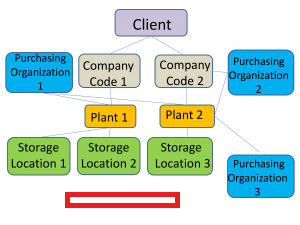SAP MM Organisational Structure
SAP MM Organisational Structure or Enterprise Structure is a part of SAP MM Training and tells about the fundamentals of SAP MM (Materials Management) which is essential for the conceptual understanding for Consultants and everyone who is interested in learning SAP MM.
This structure is focused on the view point of SAP MM.
SAP MM Organisational Structure reflects the organisational hierarchy in a company. It is an important document created at the stage of Blueprint itself which requires the analysis of Business process within a company and which can be sign off if required.
Especially when a company is operating on a large scale with complex activities Enterprise Structure is very crucial activity.
In SAP ERP several internal structures of a company reflect in the Enterprise Structure. In the viewpoint of MM(Materials Management) following can be a part of its structure.
- Client
- Company Code
- Plant
- Storage Location
- Purchasing Organization
- Purchasing Group

Client
It is a highest organizational unit in SAP. It represents the corporate group.
We will take an example of a client for better understanding.
We consider a fictional group XYZ ltd. which has different companies like XYZ steel, XYZ retail and XYZ pharma. Then in this case if XYZ ltd. implements SAP for all its companies in a single instance then it is term as client.
Company Code
It is an independent and legal unit which have to maintain its own books of accounts like profit and loss account, balance sheet. Company code creation has to done by FI(Financial) consultant.
After creation, it has to be assign to various other objects.
Plant
A plant can be define differently according to the roles and uses. For PP(Production Planning), a plant is an organizational unit where activities related to production takes place.
Likewise, for MM(Materials Management) plant is where valuated inventory is maintained.
Storage Location
A storage location is a physical place or location where inventory is the store. It is assign to Plant. The storage location can be different based on Material Type.
Purchasing Organization
A purchasing organization looks after all the purchasing activities as well as documentation part like Purchase Orders, Contract or Scheduling agreement etc.
A major part of P2P(Procure to Pay cycle) is maintained by Purchasing Organization.
Purchasing Organization can be of different types:
-
Enterprise Level
A single purchasing organization for corporate level. It will responsible for purchasing activities for all company codes within the enterprise.
It can be use when central purchasing department works for all the purchasing and related work.
-
Plant Level
In this case, purchasing organization will be for an individual plant.It is useful when vendors are at local level and hence company can purchase a material locally.
-
Cross Plant
In this case, one single purchasing is responsible for the purchasing activities of several plants.
It is useful when a company is in various countries and centralize purchasing organization is not require.
-
Cross Company Code
A single purchasing organization is responsible for multiple company codes in this case.
A single purchasing organization is responsible for multiple company codes in this case.
Purchasing Group
Purchasing group are responsible for day to day buying activities as against Purchasing organization are for critical purchasing activities. They are independent of purchasing organization, company code or even plants.
Do you like the post ? , if yes then please share.
See Also : Split Valuation In SAP MM